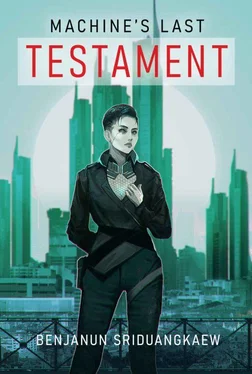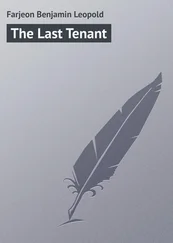“I’m sorry,” she offers, uselessly. “He was so kind to me when I got started. I didn’t know he was planning for an early termination.” Seventy, young for those born class prime. Old for someone who were not; old for someone like her mother. On Vaisravana, Xinfei would have lived longer than a century—the Warlord of the Mirror was over ninety, the height of health and virility, by the time she sent Xinfei and Suzhen away.
“He’s talked about it for years.” This from the wife. “There wasn’t anything wrong with him, his psychological profile was perfect; he barely needed the calibrations. But he felt old inside. That his time was done. That more days were pointless because nothing changes, nothing is new. As if we weren’t enough, the two of us, the three of us. I don’t think I will ever forgive him.”
Above the cremation tube, an image of him regards the funeral, mouth moving soundlessly.
To be inside Suzhen’s home is much like being inside a book. Not its substance or style, the prose and ligaments that create its matter; rather it is like peering into the process of its making—the way pages are bound and cover embossed, how the spine is soldered to bear cohesion’s weight. Ovuha disturbs nothing, opens no door to which she has not been invited—she is no thief, not of objects or a person’s privacy. But merely inhabiting this physical space tells her any number of things about its owner. How Suzhen arranges her home and therefore views the world; how she sorts her belongings, how she moves in a space that belongs to her alone, how her tastes run.
What Ovuha gleans is not quite what she expected.
Prior to now, she assumed the charity was selfish, superficial, the brittle act of someone with something to prove. Now she gets the sense that she’s misjudged, for there is an impression of temporariness to Suzhen’s apartment. What is ostentatious and elaborate has all, Ovuha is certain, been gifts: the ceramics, the silverware, the decorative frames. They clash too much with the rest of the decor and belongings to be Suzhen’s own purchases. The majority of her wardrobe is tasteful but much plainer than the sculpted scarf, the silk robe—an eye for function first, for efficiency, in cost as well as in design. Nothing sentimental decorates the place, as far as Ovuha can judge, excepting the altar. Suzhen doesn’t regard this place a home so much as an in-between, a makeshift that she may any moment have to abandon.
Ovuha has seen this treatment of home as transient—unstable and therefore not home at all—among three categories of people: soldiers, spies, and refugees.
On her part she keeps to the parlor, makes the couch as much of a living space as she can, circumscribed and small. Simple enough when she has little to begin with. She does not intrude on the rest of the apartment, does not touch any furniture or cutlery, any area that is not explicitly permitted to her. When she is satisfied that she has left no mark—that traces of her presence give nothing away about her disposition or preferences—she leaves the apartment.
Hers is a long leash. She can leave not only Suzhen’s place but the residential complex itself, a broad building that from the outside appears like miniature landscapes layered onto each other: forested glades, faceted topiaries, orchards of glittering fruits and ivory brush. Each immense floor is occupied by no more than three or four residents, mostly without family. Anatta is a world of excess, of inexhaustible bounty. Anything may be had, as long as it is not a request to be free of Samsara’s silken order, to be outside the reach of its velvet palm.
Ovuha doesn’t try the trains or any other public transport; she would be especially surveilled there, and her status would be flagged to Interior Defense or Bureau officials. Any of them could detain and question her on a whim because she is breathing, because her gait displeases them, because to them she is effluvium. She ranges around the residential complex’s immediate vicinity, noting as she does the foot traffic, the type of crowds. The district is low in population, but most citizens’ districts are, a world where people are spread out. Easier to control, she surmises, segregated by citizen classes and also by political opinions.
Opinions—not that she’s seen citizens express any, but she has been limited in her exposure. To her they are uniform, self-satisfied and frictionless, as fundamentally empty as marionettes: hollowed out by comforts, by not having to think or choose save in the most trivial of manners. Suzhen is a rare exception. Or perhaps Ovuha has been seduced by what is merely human regard—but now is not the time to consider her personal feelings, her emotional reactions. In the grand cartography of things, Suzhen is beside the point.
According to the map that she extracted from the contact toxin, the network nodes she needs are in Indriya and Himmapan. Ones she will need to get physically proximate to verify the existence of, though she will not be able to activate them until she has all the requisite keys. And until the time is right.
Ovuha walks, outwardly aimless, testing the extent of her leash still. When no warning flashes on her portable and no shock emanates from her tracker, she ventures further, and then further again. It is true that Samsara is limitless, omniscient. But even an AI like that cannot monitor everything, split the filaments of its mind infinitely: a compromise must be made, and unless a potentiate or citizen is demonstrating aberrational behavior, there is no reason for it to pay heed.
By the district’s very edge, her implant reacts. Subroutines for basic detection rouse, finding their twin, their match. The spot, from the surface, bears no special marker: it is just another segment of footbridge, gleaming stone and a view of filigreed river. Like so much else it is contingency upon contingency, and the node’s placement must have been done decades ago, probably before she was born. An act hidden from Samsara, achieved by an agent that was able to infiltrate civil engineering, or someone even further back in time. She doesn’t stand there, doesn’t pause to appreciate this sign of success. Simply she walks on, betraying no reaction.
There’s the question of her contact here, the one who arranged the attack that contained a map—but that knowledge wasn’t passed to her precisely because it risks the entire enterprise. She’s been conditioned against interrogation but that is no guarantee, and what she does not know cannot be tortured out of her. So she must work blindfolded, as fumbling as any moth caught in the web and the old warlord a spider manipulating the universe from beyond the grave. A woman whose heart was a tireless engine and who forged Ovuha’s to be the same. The woman who found within the endless ranks of the Peace Guard a weakness, an opening through which Anatta may be struck and pried apart.
She looks down at her wrist, where the thornworks sigil used to abide and mark her as successor to the office: a necessity when the title came with a mask and usurpers were not unheard of. Erased since, for she does not require it here. Her fingers twitch—her datasphere used to have a tactile element that she could interface with her hands; the Anatta standard sports none at all. It would be a tell.
People pass her by, making no comment, sparing her no second glance. She spends a little time observing them, trying to envisage for them an interiority, knowing as she does it is a failure of her own imagination that she cannot. A group of clerks on break—workplaces shift their breaks a few hours apart so the trains never get overcrowded. They chatter about a new spectator sport, a mix of obstacle course and unarmed combat, done in person and with the flesh rather than in virtuality. They discuss their bets, the rising stars and the sure losers. Ovuha frowns and immediately smooths out her expression. It sounds like bloodier display than she would expect on Anatta, but perhaps that is another outlet, another part of the process by which Samsara controls the human taste for violence. That animal thirst, which in local doctrines is intrinsic, and which must be caged and corrected.
Читать дальше












